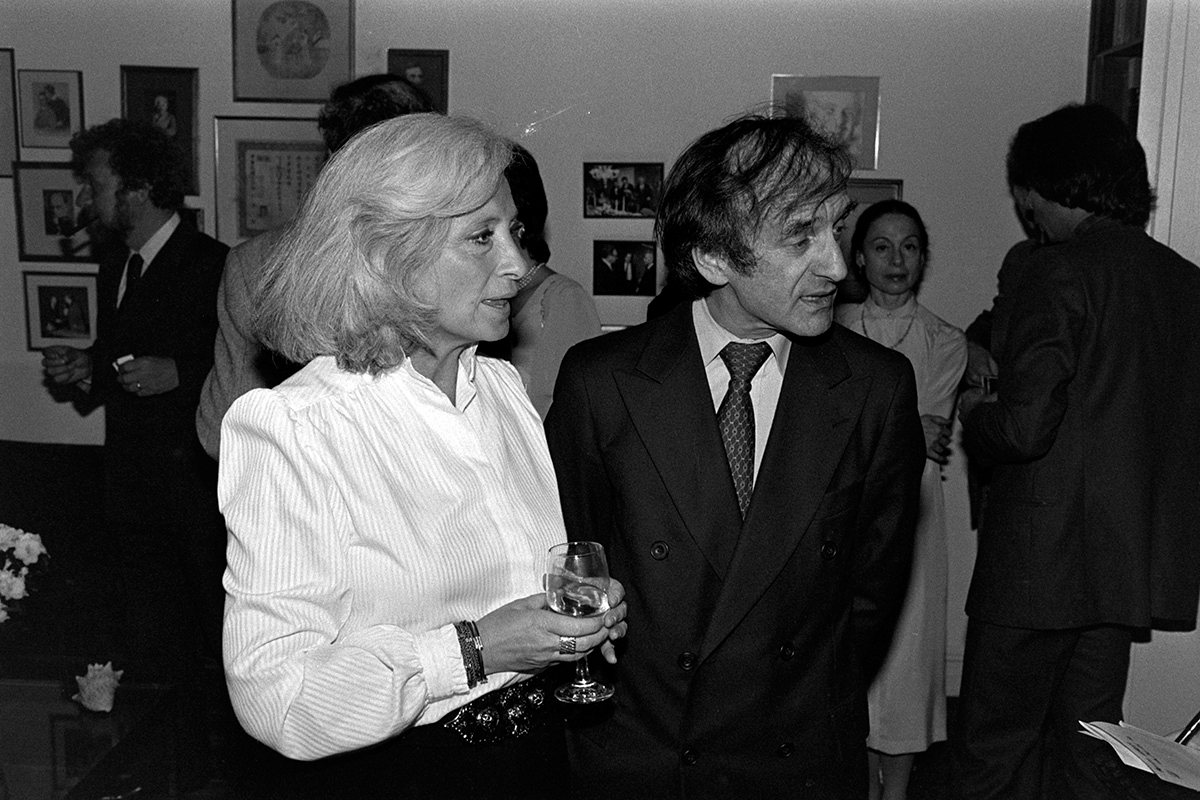Marion Wiesel could have ended up in Auschwitz, just like her husband, author Elie Wiesel. Instead, the translator and activist, who passed away last week at age 94, and her family managed to escape the French concentration camp they were in — the Gurs Internment Camp — before the Jews were deported to Eastern Europe, the majority of them perishing in the Nazi death camp.
Marion was born Mary Renate Erster in Vienna in 1931, the daughter of a Jewish furniture salesman. After the Anschluss, her father, who was also a social democrat, couldn’t stay in the country and escaped with her older sister to Belgium. Mary and her mother soon followed. It was there she reclaimed her name as Marion. The family kept running all through the war, and finally ended up in Switzerland. In 1949, they made their way to the U.S. where Marion tried to build a life for herself. She attended college in Miami, worked at a department store, got married to her first husband and had a daughter. Having witnessed racism in America, she became a member of the NAACP and joined the civil rights movement.
When she met Elie, that first marriage had disintegrated. Aside from their tales of survival, the two had so much in common: a love of languages, books and social justice. The two talked about their mutual love for French literature and later married in Israel in 1969. They welcomed their son, Shlomo Elisha Wiesel, named after Wiesel’s father who perished in the Holocaust, in 1972.
Marion Weisel's translation of her husband, Elie's, work & her other projects helped educate a generation on the horrors of the Holocaust & the resilience of her fellow survivors.
We shall never forget her powerful work. May her memory be for a blessing.https://t.co/Gnl6rBLhRo
— Rep. Debbie Wasserman Schultz (@RepDWStweets) February 3, 2025
“I watched my mother just bloom into a person who wanted to help others and be strong for those who didn’t have a voice,” her daughter, Jennifer Rose, recalled. Marion, many have asserted, was instrumental in creating Elie Wiesel’s legacy. She wound up translating 14 of his books, and helped make his book “Night” a bestseller with her new English translation that came out in 2006. Of the 10 million copies of the book sold worldwide, three million were of her translation.
“As his translator from the French,” their editor, Ileene Smith, told the New York Times, “Marion pored over every sentence of Elie’s work with astonishing insight into his interior world, his literary mind.”
She was instrumental in shaping Wiesel’s iconic speech in which he faced President Reagan, asking him not to visit the Bitburg Cemetery where SS soldiers were buried. “That place, Mr. President, is not your place,” he decried. “Your place is with victims of the SS.”
“She was an essential part, the essential part of that partnership in terms of taking the things that Elie Wiesel ultimately created over the years and turning it into good actions,” journalist Ted Koppel said of Marion.
Wiesel also found ways to keep the memory of the Holocaust alive outside of her husband’s work. She edited a collection of Roman Vishniac’s photography about Jewish light before World War II in Eastern Europe titled “To Give Them Light” and wrote and directed a documentary about children killed during the Holocaust, “Children of the Night.”
In 1986, after Wiesel won the Nobel Prize for peace, the two founded the Elie Wiesel Foundation for Humanity together. She was a founding chairman of the United States Holocaust Memorial Museum. Starting in the 1990s, as part of her work in that foundation, she helped manage the Beit Tzipora Centers, named after Elie’s sister, killed in Auschwitz, which, to this day, help Jewish Ethiopian immigrants to Israel with a myriad of challenges.
In 2001, Marion was awarded a presidential medal of honor from President Bill Clinton for her “mission of hope against hate, of life against death, of good over evil.” Clinton said that despite the horrors she survived, she “summoned the courage to commit her life to teaching others, especially children, about the human cost of hatred, intolerance and racism.”
“The curtain descends on a story, and lead character, for the ages,” Elisha Wiesel wrote of his mother on X this past Monday. May her memory be for a blessing.








